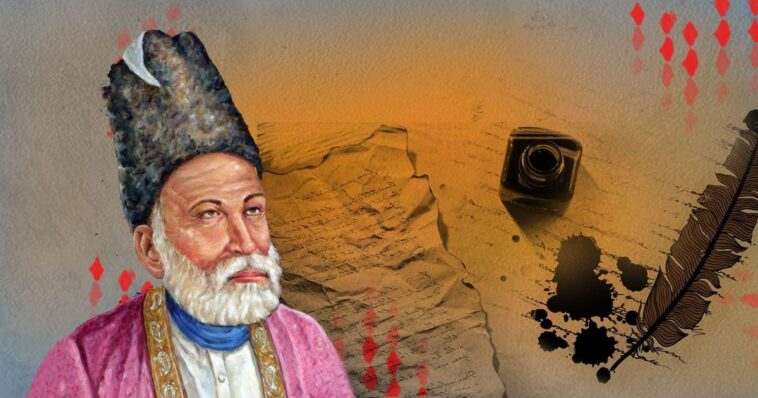Mirza Ghalib, Born on December 27, 1797, in the city of Agra, his life was filled with tragedy. Several of his loved ones died, and he himself struggled with poverty and drug use. Even so, even after Ghalib died in 1869, his poetry has continued to touch people’s hearts for many years to come.
On the anniversary of Mirza Ghalib’s death, we remember him and think about how much his poetry has meant to many people over the years. His poetry shows a deep understanding of what it’s like to be human, and millions of people around the world find comfort and inspiration in his lines.
Mirza Ghalib has written a lot of couplets, but there are a few that stand out as being especially powerful and moving. Here are a few of his most famous lines that are sure to make you feel something:
“Hazaaron khwahishen aisi ke har khwahish pe dam nikle,
Bahut niklay mere armaan, lekin phir bhi kam nikle.”
This couplet encapsulates the essence of human desire and the fact that even if one were to fulfil all their desires, there would still be more to come. It speaks to the insatiable nature of human wants and needs.
“Dil-e-nadan tujhe hua kya hai?
Aakhir is dard ki dawa kya hai?”
This couplet speaks to the human experience of heartbreak and the search for solace. It asks the question of what can be done to cure the pain of a broken heart.

“Ishq par zor nahin hai ye woh aatish Ghalib,
Jo lagaye na lage aur bujhaye na bane.”
This couplet is about the power of love and its ability to ignite a fire that cannot be contained. It speaks to the fact that love is an unstoppable force that cannot be controlled or extinguished.
“Umr-e-daraaz mang ke lai thi chaar din,
Do arzoo mein kat gaye, do intezaar mein.”
This couplet speaks to the fleeting nature of life and how quickly time passes. It asks the question of whether it is worthwhile to spend one’s life in pursuit of one’s desires and wait for what is yet to come.
Also read: Pakistan economic crisis : tax hikes in return for massive IMF bailout
“Har ek baat pe kehte ho tum ki tu kya hai,
Tumhi kaho ki ye andaaz-e-guftgoo kya hai?”
This couplet speaks to the futility of trying to define oneself to others and the importance of individual perspective. It questions the meaning of conversation and asks if it is truly a two-way exchange.
Also read:
“Koi ummeed bar nahin aati, koi soorat nazar nahin aati,
Maut ka ek din muayyan hai, neend kyon raat bhar nahin aati?”
This couplet speaks to the feeling of hopelessness that can sometimes pervade our lives. It asks why we cannot find rest when death is certain and the night seems so long.
Mirza Ghalib poetry continues to resonate with people across the world, and his couplets remain a source of comfort and inspiration to this day. On his death anniversary, let us take a moment to reflect on his legacy and the impact that he has had on so many people’s lives. (ANI)




